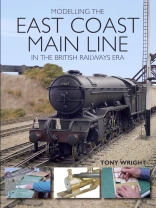Modelling the East Coast Main Line in the British Railways Era follows the construction of an East Coast Main Line layout in 00 gauge, based on the Little Bytham prototype. Little Bytham, nestled in rural Lincolnshire, is the station nearest to where the fastest steam exploits in the country were achieved. Nearby, the Flying Scotsman became the first steam locomotive to reach 100 miles per hour, Papyrus broke the world speed record for a non-streamlined locomotive, and Mallard set the current world speed record for a steam locomotive. This practical guide escorts the reader through all aspects of constructing an East Coast Main Line layout and topics include baseboard construction, track laying and ballasting; wiring and making signals; modelling scenery, buildings, locomotives, carriages and wagons and how to plan an operation sequence.The book also covers research, planning and preparation; constructional procedures, methods and techniques applicable to all scales, gauges, and time periods, and is a practical guide to all aspects of constructing an East Coast Main Line layout. Lavishly illustrated with over 600 colour photographs including step-by-step sequences.
Giới thiệu về tác giả
Tony Wright has had an interest in railways, both prototype and model, ever since he saw a Princess Coronation in Chester General Station at five years old. Following a career in education, he became a freelance photojournalist in 1992, specializing in model railways. He also took up professional loco building and, with Wolverhampton MRC, was involved in the building of several highly successful exhibition layouts. Tony was Assistant Editor/Photographer for British Railway Modelling until 2011 and also served as President of the Historical Model Railway Society. He now spends his time making models, writing articles and photographing products and layouts.












